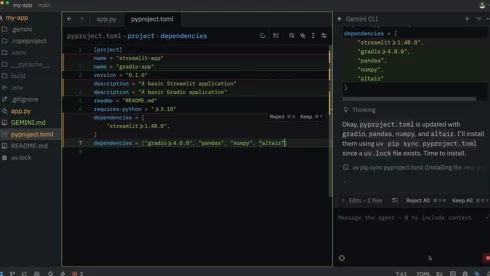
Google has announced that it has brought the Gemini CLI to the open source code editor, Zed. The new integration will enable Zed users to generate and refactor code in the editor, get instant answers on code or error messages, and chat naturally in the terminal.
Developers will be able to follow along live with the Gemini agent as it makes changes. Once the agent is done working, Zed will display the changes in a review interface that shows a clear diff for each edit that can be reviewed, accepted, or modified, providing the same level of control as a code review.
Users will also be able to provide context beyond the codebase by pointing the agent to external sources like a URL with documentation or an API spec.
This integration is possible because Zed created the Agent Client Protocol (ACP) to enable third-party agents to work directly in the platform. “Because software developers rely on diverse tools in a variety of different tech stacks, we see room for multiple agents competing to solve problems in different domains,” Zed wrote in a blog post.
Around the time that Zed was creating ACP, Google reached out to discuss bringing the Gemini CLI to the editor, as a result of the Gemini CLI team using their agent in Zed.
“As an open-source project with a ton of early traction, Gemini CLI seemed like a perfect way to drive the design of extensible agents in Zed with a concrete use case,” Zed wrote.
Zed sees this integration with Google as a starting point for what’s possible with ACP. ACP is an open source protocol, and any agent can implement it, and other code editors can adopt it as well. For instance, the Zed team has been working with Code Companion to bring ACP-compatible agents to Neovim.
“We believe the best tools come from openness. Just as the Language Server Protocol opened up IDEs to specialized tools, ACP creates space for an ecosystem of agents tailored to every developer’s workflow. We appreciate Google’s open approach with Gemini CLI, which made this collaboration possible, and we’re committed to the same. We intend to maintain enough control over the Agent Client Protocol to continue to push it forward quickly, while also evolving and versioning it carefully to encourage an ecosystem of agents and clients to develop,” Zed wrote.






